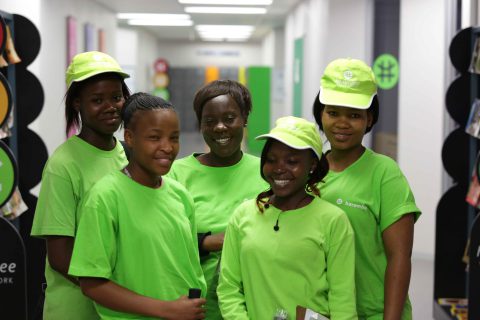Empowerment Government & Politics
On The Agenda: Economic Redress
Discussing radical economic transformation (RET) with people from the corporate world is certainly not easy. It is a difficult topic, but, it is a necessary discussion. The term has grown in prominence since President Zuma used it extensively in his State of the Nation Address to the opening of Parliament in February this year.
The previous Minister of Finance, Malusi Gigaba, was careful not to talk too recklessly about radical economic transformation, preferring to use the term “inclusive growth”. We tried to arrange a corporate roundtable on this topic, but found it very difficult to get much interest, maybe because the topic has the potential to be controversial and divisive.
We wanted to unpack what is meant by radical economic transformation, look at what government’s priorities are in terms of this programme, where interventions are taking place, how do we measure policies and strategies initiated to support RET and, finally, look at the role that corporate South Africa could play.
Yamkela Makupula, associate director at PricewaterhouseCoopers (PwC) said she hoped that radical economic transformation was more than just a slogan. “If you look at where we come from, it was important for us to have political transformation. We needed to have political power.
“What our leaders did not do was to speak to the people about the meaning of freedom. Freedom was so much based on things like running water, houses, electricity. They have done that (providing basic infrastructure) and they are still doing that. But younger people who do not remember not having houses without electricity and running water want so much more. Now that the basic stuff is taken care of, people are talking about economic transformation. They want to know what is happening at the JSE. Who is leading there? They want to know about ownership of companies and the economy. Whoever is in power really has no choice. In order for them to stay in power, they have to put radical economic transformation on the agenda, because that is our new expectation from government. Is it just a slogan? I hope not, because it is a big expectation from our people,” says Makupula.
Nontokozo Madonsela of Standard Bank felt that the word radical could be inspiring for some people while for others it could be threatening. “There appears to be almost a shift in psychology because people are more conscious of the drivers and the reasons why things need to transform. But ultimately it is also about people wanting money.
“I can think of the whole issue of social grants. There was a programme at schools in rural KwaZulu-Natal where people were trying to dissuade children from falling pregnant. They gave children dolls so that they could feel the pain of raising children, but the programme failed because the kids want the money that comes from social grants. They equate pregnancy with how much money they will receive in social grants.
“Many people seem to be driven by the desire for cash. For instance, these young girls who want money every time they have a baby. There are also the people who should have gotten land back through the restitution process, but chose to take cash instead. In a few months, most of the money is gone and the land is gone, and everything is back to normal. Ownership is the thing that will make a difference to all the people in South Africa,” says Madonsela.
Makupula agreed and felt that radical economic transformation in corporate South Africa had to be driven from the top.
“At PwC, we could see the difference when they appointed a black CEO. Before that, as a young black person, you would not dream of one day occupying the highest office in the company, but when they appointed Dion Shango as CEO, one of the first things he did was to transform his leadership team.
“The leadership team is now dominated by Africans, coloureds and Indians. They also appointed a black woman as board chairperson. Now, when a young girl from KZN walks into PwC, she will think that one day she too can aim for that top position,” says Makupula.
A perfect example of this, the participants agreed, would be the Johannesburg Stock Exchange (JSE). “When transformation starts from the top, it has a rippling effect, and soon you will see champions who are sitting in leadership that you can relate too. So, if the JSE team is mainly white, then the people who will come up from the bottom will be mainly white.
“But if your leadership is mixed, then the rural child from KZN or the Eastern Cape suddenly has people to look up to and they know that, irrespective of where they come from, they have a better kind of a future going forward,” she adds.
The bigger problem, of course, is to create the opportunities where children can realistically dream of reaching for the stars. One of the biggest problems in transformation is that the poor children in the rural areas will never be able to leave the rural areas, they will never be able to find work, and they will never be in a position where they can one day dream of leading a JSE-listed company.
Madonsela said she could relate to the belief that you can achieve based on the people who are in charge. “My boss, Funeka Montjane, is the most incredible woman, and that makes me believe that I can also achieve the top position. But the other difference is the perception of people outside of the organisation.
“People now feel more comfortable to approach the leader irrespective of whether they speak English well or not, or how they look. This is what transformation is about.”
Government and corporate South Africa playing their part
There is a perception that radical economic transformation is something that should just concern government and that corporates do not have a role to play. Makupula disagrees.
“It should not just be a government agenda, but it should be a partnership between government, the private sector and the people. As long as it appears to be a policy driven by government, and in a way talked down to everyone else, then it becomes an issue. “Government might say that they have consulted some of the business organisations, but the consultation needs to be much broader than that. Business organisations don’t represent the whole country. No one can work alone on transforming the economy, not government or business.”
While radical economic transformation involves creating opportunities for people who did not previously have access to opportunities, it is also important to make sure that people are prepared and trained to make the best of these opportunities.
“There are many ways of accessing capital if you have a business,” said Madonsela, “but most of it involves a lot of red tape. Imagine if someone like me, who is trained in Powerpoint, Excel and other corporate activities, is intimidated by interacting with the requirements of, for instance, some of the youth funds. Radicalising might mean turning those requirements upside down. It can be quite daunting.”
One of the things that is worrying about radical economic transformation is that it has taken the government more than 23 years to realise that it is necessary. We achieved our political freedom when we voted for the first time in our first democratic elections in 1994.
However, for most people in South Africa, their living conditions have not changed much since then. But can we realistically have radical economic transformation in an environment where the economy is not growing?
Makupula feels that we cannot separate the growth of the economy from the transformation of the economy. “When we achieved political power, we did not have the understanding or the resources that we have now. We believed that political power meant economic power. We also had to deliver on basic things like housing, electricity and water. “During Thabo Mbeki’s regime, you could see that his agenda was to drive economic growth because, for some reason, we separated the growth of the economy from transformation.
“Now, we are saying that we will transform at all cost. You can’t do that. The economy has to grow in order for you to be able to radically implement transformation. If we don’t do this, we will be sitting at the table again in 20 years’ time and asking ourselves why we did not do it.
“The economy is not growing enough for us to be able to implement these radical strategies that we have and, as a result, they are going to continue to be just strategies.”
One of the ways in which business can play a role in growing the economy is by investing in South Africa. However, the political instability we have weathered over the past few years, and our downgraded by ratings agencies, make it difficult for businesses to commit to our country.
“Government needs to work more closely with business. There is no other way,” says Makupula.
Madonsela feels that we need to talk about transformation in a broader sense, including the transformation of the person, the physical and
the emotional.
“Transformation should not only be about the economy but about society as a whole. Psychology is important. You cannot transform society if you do not transform psychologically. This will also be the only way that transformation is sustainable.”
Makupula agrees. “If I don’t change my mindset, then what am I going to do with the land when I receive it? If I have a poverty mentality, I will never be able to handle billions of rands as the CEO of a big financial company. I would probably steal because I have a poverty mentality.”
The key to economic transformation is to make sure that it trickles down to the lowest level in society. It is not enough to empower someone just because they are black.
They need to understand the importance of undoing the damage of apartheid and colonialism, and that will only be done by empowering as many people as possible, and not only individuals. “You have to bring whole communities into business, even into JSE-listed businesses,” says Madonsela. “And you must make sure that they have the skills to take the business forward,” adds Makupula.
Ultimately, radical economic transformation is not a bad concept, because it could help to unlock areas in our economy that might have previously remained completely unexplored.
However, it is not going to come about because government said so.
It will take a commitment from various sectors of society, including business. It will also take real leadership that realises that transformation does not need to be feared. In fact, it should be embraced.






 Sign-up and receive the Business Media MAGS newsletter OR SA Mining newsletter straight to your inbox.
Sign-up and receive the Business Media MAGS newsletter OR SA Mining newsletter straight to your inbox.